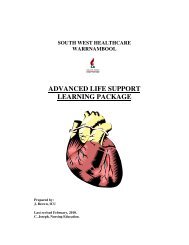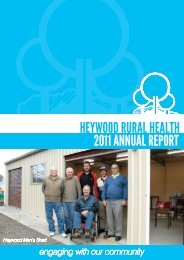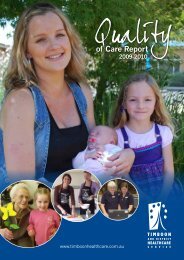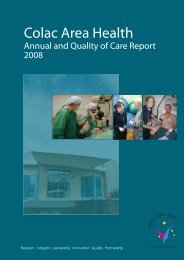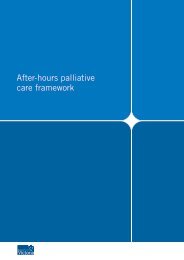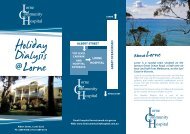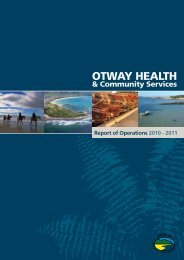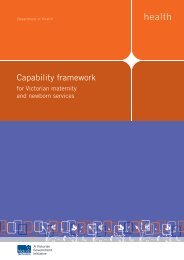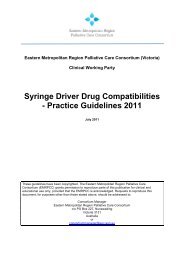Self Directed Learning Package - University of Queensland
Self Directed Learning Package - University of Queensland
Self Directed Learning Package - University of Queensland
- No tags were found...
Create successful ePaper yourself
Turn your PDF publications into a flip-book with our unique Google optimized e-Paper software.
64 • The Palliative Approach ToolkitCase study – AnnaAnna is 82 years old. She was born in Germany but has lived in Australia for over30 years. She was admitted to the dementia unit shortly after the death <strong>of</strong> herhusband.Before her diagnosis <strong>of</strong> dementia, Anna had made it clear to her GP that she wouldalways want to be resuscitated in the event <strong>of</strong> a respiratory or cardiac arrest. TheGP had clearly documented these wishes in her notes.Anna has one adult child, Helen, who has found it extremely difficult to accept herfather’s death and her mother’s declining mental capacity.Helen holds the legal right to make decisions about her mother’s care and is theimmediate ‘next <strong>of</strong> kin’ for her mother. Helen, however, has been reluctant tobecome involved in discussions regarding planning for her mother’s care. Contacthas been made with Anna’s grandson David who has agreed to assist staff withmaking a care plan for Anna. Despite her mental confusion and ill health, Annarecognises David and appears to agree with his suggestions.Over a short period <strong>of</strong> time, Anna’s physical health has begun to deteriorate. Shesuffers more frequent angina attacks and has become wheelchair bound as a result<strong>of</strong> a fall that caused her right hip to fracture. She also has been experiencing lowoxygen saturation, tiredness and shortness <strong>of</strong> breath.This morning, you are asked to review Anna by the careworker. Anna is clearly unwelland you note a drop in blood pressure, pale skin and obvious shortness <strong>of</strong> breath.You contact the doctor and her family to relay this change in condition. When Helenarrives, she tells you that she does not wish to have her mother resuscitated ortransferred to hospital.Thinking PointWhat do you think will happen to Anna and why?This is a common scenario in RACFs. It is a good example <strong>of</strong> whythere has been a move from simply asking about resuscitation toa broader approach <strong>of</strong> advance care planning.Key PointA key advantage <strong>of</strong> having an advance care planis that they can extend a resident’s autonomy.However the process is about more than justgetting a form filled in or directives documented inthe clinical notes. Discussing these with family andother parties is equally important.Substitute decision makingDiscussions about advance care planning ideally should involvethe resident when s/he is capable <strong>of</strong> making decisions abouttheir preferences for living and dying well. But what about thoseresidents who are no longer deemed competent to make thesedecisions or are unable to express their wishes?Thinking PointWhat if Anna had not communicated her wishes toher GP before she experienced significant cognitivedecline? Do decisions about care and treatmentautomatically defer to the family?If a resident is not competent to make decisions, they cannotcomplete an advance health directive or legally appointsomeone to advocate on their behalf.



